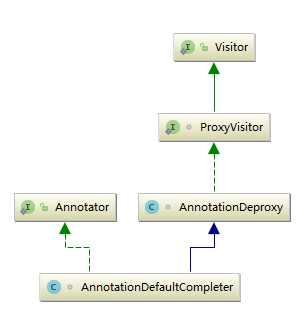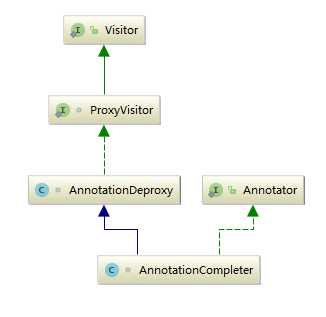在Annotate类中有个Annotator接口,定义如下:
/** A client that has annotations to add registers an annotator,
* the method it will use to add the annotation. There are no
* parameters; any needed data should be captured by the
* Annotator.
*/
public interface Annotator {
void enterAnnotation();
String toString();
}
其中的实现分部在MemberEnter与ClassReader类中,如下:

方法1:
/** Queue processing of an attribute default value. */
void annotateDefaultValueLater(final JCExpression defaultValue,
final Env<AttrContext> localEnv,
final MethodSymbol m) {
annotate.later(new Annotate.Annotator() {
public String toString() {
return "annotate " + m.owner + "." + m + " default " + defaultValue;
}
public void enterAnnotation() {
JavaFileObject prev = log.useSource(localEnv.toplevel.sourcefile);
try {
enterDefaultValue(defaultValue, localEnv, m);
} finally {
log.useSource(prev);
}
}
});
}
/** Enter a default value for an attribute method. */
private void enterDefaultValue(final JCExpression defaultValue,
final Env<AttrContext> localEnv,
final MethodSymbol m) {
m.defaultValue = annotate.enterAttributeValue(m.type.getReturnType(),defaultValue,localEnv);
}
方法2:
/** Queue annotations for later processing. */
void annotateLater(final List<JCAnnotation> annotations,
final Env<AttrContext> localEnv,
final Symbol s) {
if (annotations.isEmpty()) {
return;
}
if (s.kind != PCK) {
s.attributes_field = null; // mark it incomplete for now
}
annotate.later(new Annotate.Annotator() {
public String toString() {
return "annotate " + annotations + " onto " + s + " in " + s.owner;
}
public void enterAnnotation() {
Assert.check(s.kind == PCK || s.attributes_field == null);
JavaFileObject prev = log.useSource(localEnv.toplevel.sourcefile);
try {
if (s.attributes_field != null &&
s.attributes_field.nonEmpty() &&
annotations.nonEmpty()) {
log.error(annotations.head.pos, "already.annotated", kindName(s), s);
}
enterAnnotations(annotations, localEnv, s);
} finally {
log.useSource(prev);
}
}
});
}
其中调用了enterAnnotations()方法,代码如下:
/** Enter a set of annotations. */
private void enterAnnotations(List<JCAnnotation> annotations,Env<AttrContext> env,Symbol s) {
ListBuffer<Attribute.Compound> buf = new ListBuffer<Attribute.Compound>();
Set<TypeSymbol> annotated = new HashSet<TypeSymbol>();
if (!skipAnnotations) {
for (List<JCAnnotation> al = annotations; al.nonEmpty(); al = al.tail) {
JCAnnotation a = al.head;
Attribute.Compound c = annotate.enterAnnotation(a, syms.annotationType, env);
if (c == null) {
continue;
}
buf.append(c);
// Note: @Deprecated has no effect on local variables and parameters
if (!c.type.isErroneous()
&& s.owner.kind != MTH
&& types.isSameType(c.type, syms.deprecatedType)) {
s.flags_field |= Flags.DEPRECATED;
}
// Internally to java.lang.invoke, a @PolymorphicSignature annotation
// acts like a classfile attribute.
if (!c.type.isErroneous() &&
types.isSameType(c.type, syms.polymorphicSignatureType)) {
if (!target.hasMethodHandles()) {
// Somebody is compiling JDK7 source code to a JDK6 target.
// Make it an error, since it is unlikely but important.
log.error(env.tree.pos(), "wrong.target.for.polymorphic.signature.definition", target.name);
}
// Pull the flag through for better diagnostics, even on a bad target.
s.flags_field |= Flags.POLYMORPHIC_SIGNATURE;
}
if (!annotated.add(a.type.tsym)) {
log.error(a.pos, "duplicate.annotation");
}
}
}
s.attributes_field = buf.toList();
}
方法3:
/** Import statics types of a given name. Non-types are handled in Attr.
* @param pos Position to be used for error reporting.
* @param tsym The class from which the name is imported.
* @param name The (simple) name being imported.
* @param env The environment containing the named import
* scope to add to.
*/
private void importNamedStatic(final DiagnosticPosition pos,
final TypeSymbol tsym,
final Name name,
final Env<AttrContext> env) {
if (tsym.kind != TYP) {
log.error(DiagnosticFlag.RECOVERABLE, pos, "static.imp.only.classes.and.interfaces");
return;
}
final Scope toScope = env.toplevel.namedImportScope;
final PackageSymbol packge = env.toplevel.packge;
final TypeSymbol origin = tsym;
// enter imported types immediately
new Object() {
Set<Symbol> processed = new HashSet<Symbol>();
void importFrom(TypeSymbol tsym) {
if (tsym == null || !processed.add(tsym)) {
return;
}
// also import inherited names
importFrom(types.supertype(tsym.type).tsym);
for (Type t : types.interfaces(tsym.type)) {
importFrom(t.tsym);
}
for (Scope.Entry e = tsym.members().lookup(name); e.scope != null; e = e.next()) {
Symbol sym = e.sym;
if (sym.isStatic() &&
sym.kind == TYP &&
staticImportAccessible(sym, packge) &&
sym.isMemberOf(origin, types) &&
chk.checkUniqueStaticImport(pos, sym, toScope)) {
toScope.enter(sym, sym.owner.members(), origin.members());
}
}
}
}.importFrom(tsym);
// enter non-types before annotations that might use them
annotate.earlier(new Annotate.Annotator() {
Set<Symbol> processed = new HashSet<Symbol>();
boolean found = false;
public String toString() {
return "import static " + tsym + "." + name;
}
void importFrom(TypeSymbol tsym) {
if (tsym == null || !processed.add(tsym)) {
return;
}
// also import inherited names
importFrom(types.supertype(tsym.type).tsym);
for (Type t : types.interfaces(tsym.type))
importFrom(t.tsym);
for (Scope.Entry e = tsym.members().lookup(name);e.scope != null;e = e.next()) {
Symbol sym = e.sym;
if (sym.isStatic() &&
staticImportAccessible(sym, packge) &&
sym.isMemberOf(origin, types)) {
found = true;
if (sym.kind == MTH ||
sym.kind != TYP && chk.checkUniqueStaticImport(pos, sym, toScope)) {
toScope.enter(sym, sym.owner.members(), origin.members());
}
}
}
}
public void enterAnnotation() {
JavaFileObject prev = log.useSource(env.toplevel.sourcefile);
try {
importFrom(tsym);
if (!found) {
log.error(pos, "cant.resolve.location",
KindName.STATIC,
name, List.<Type>nil(), List.<Type>nil(),
Kinds.typeKindName(tsym.type),
tsym.type);
}
} finally {
log.useSource(prev);
}
}
});
}
方法4:
/** Import all static members of a class or package on demand.
* @param pos Position to be used for error reporting.
* @param tsym The class or package the members of which are imported.
* @param toScope The (import) scope in which imported classes are entered.
*/
private void importStaticAll(int pos,
final TypeSymbol tsym,
Env<AttrContext> env) {
final JavaFileObject sourcefile = env.toplevel.sourcefile;
final Scope toScope = env.toplevel.starImportScope;
final PackageSymbol packge = env.toplevel.packge;
final TypeSymbol origin = tsym;
// enter imported types immediately
new Object() {
Set<Symbol> processed = new HashSet<Symbol>();
void importFrom(TypeSymbol tsym) {
if (tsym == null || !processed.add(tsym)) {
return;
}
// also import inherited names
importFrom(types.supertype(tsym.type).tsym);
for (Type t : types.interfaces(tsym.type)) {
importFrom(t.tsym);
}
final Scope fromScope = tsym.members();
for (Scope.Entry e = fromScope.elems; e != null; e = e.sibling) {
Symbol sym = e.sym;
if (sym.kind == TYP &&
(sym.flags() & STATIC) != 0 &&
staticImportAccessible(sym, packge) &&
sym.isMemberOf(origin, types) &&
!toScope.includes(sym)
){
toScope.enter(sym, fromScope, origin.members());
}
}
}
}.importFrom(tsym);
// enter non-types before annotations that might use them
annotate.earlier(new Annotate.Annotator() {
Set<Symbol> processed = new HashSet<Symbol>();
public String toString() {
return "import static " + tsym + ".*" + " in " + sourcefile;
}
void importFrom(TypeSymbol tsym) {
if (tsym == null || !processed.add(tsym)) {
return;
}
// also import inherited names
importFrom(types.supertype(tsym.type).tsym);
for (Type t : types.interfaces(tsym.type)) {
importFrom(t.tsym);
}
final Scope fromScope = tsym.members();
for (Scope.Entry e = fromScope.elems; e != null; e = e.sibling) {
Symbol sym = e.sym;
if (sym.isStatic() && sym.kind != TYP &&
staticImportAccessible(sym, packge) &&
!toScope.includes(sym) &&
sym.isMemberOf(origin, types)) {
toScope.enter(sym, fromScope, origin.members());
}
}
}
public void enterAnnotation() {
importFrom(tsym);
}
});
}

继承体系如下图:



类1:
class AnnotationCompleter extends AnnotationDeproxy implements Annotate.Annotator {
final Symbol sym;
final List<CompoundAnnotationProxy> l;
final JavaFileObject classFile;
@Override
public String toString() {
return " ClassReader annotate " + sym.owner + "." + sym + " with " + l;
}
AnnotationCompleter(Symbol sym, List<CompoundAnnotationProxy> l) {
this.sym = sym;
this.l = l;
this.classFile = currentClassFile;
}
// implement Annotate.Annotator.enterAnnotation()
public void enterAnnotation() {
JavaFileObject previousClassFile = currentClassFile;
try {
currentClassFile = classFile;
List<Attribute.Compound> newList = deproxyCompoundList(l);
sym.attributes_field = ((sym.attributes_field == null)
? newList
: newList.prependList(sym.attributes_field));
} finally {
currentClassFile = previousClassFile;
}
}
}
类2:
class AnnotationDefaultCompleter extends AnnotationDeproxy implements Annotate.Annotator {
final MethodSymbol sym;
final Attribute value;
final JavaFileObject classFile = currentClassFile;
@Override
public String toString() {
return " ClassReader store default for " + sym.owner + "." + sym + " is " + value;
}
AnnotationDefaultCompleter(MethodSymbol sym, Attribute value) {
this.sym = sym;
this.value = value;
}
// implement Annotate.Annotator.enterAnnotation()
public void enterAnnotation() {
JavaFileObject previousClassFile = currentClassFile;
try {
currentClassFile = classFile;
sym.defaultValue = deproxy(sym.type.getReturnType(), value);
} finally {
currentClassFile = previousClassFile;
}
}
}
